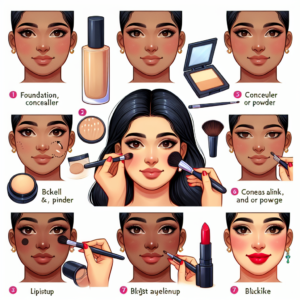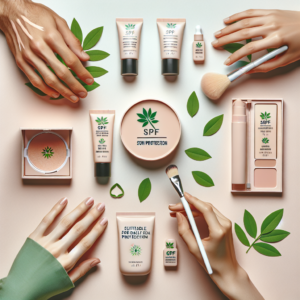
Key Takeaways
- Vegan SPF products are designed to be gentle on sensitive skin and exclude animal-derived ingredients.
- They often contain natural minerals like zinc oxide or titanium dioxide, providing protection without irritating the skin.
- Understanding SPF levels and product types is crucial for finding the right sunscreen for your skin’s needs.
- Dermatologists recommend using a minimum of SPF 30 for effective sun protection.
- Integrating vegan SPF into your daily skincare routine can have long-term benefits for skin health.
| SPF Level | Key Ingredients | Suitable for Skin Type | Special Features |
|---|---|---|---|
| SPF 30 | Zinc Oxide, Aloe Vera | All, especially sensitive | Water-resistant |
| SPF 50 | Titanium Dioxide, Vitamin E | Normal, Combination | Tinted, Fragrance-free |
| SPF 40 | Zinc Oxide, Squalane | Dry, Sensitive | Non-nano particles |
| SPF 30 | Titanium Dioxide, Antioxidants | Oily, Acne-prone | Matte finish |
As someone who values both the health of your skin and ethical skincare practices, you may have come across the term ‘vegan SPF’ and wondered if it’s the right choice for you. Let’s dive into what makes vegan SPF particularly suitable for sensitive skin and why it might be a smarter option for your daily sun protection routine.
Why Vegan SPF is a Game Changer for Sensitive Skin
When it comes to sensitive skin, every ingredient matters. Vegan SPF products are free from animal-derived ingredients, which are often harsh on delicate skin types. Instead, these sunscreens rely on plant-based or mineral components that are less likely to cause irritation or allergic reactions. This makes vegan SPF a go-to for anyone with skin sensitivities looking for effective sun protection.
The Rise of Vegan SPF Formulations
In recent years, there’s been a significant increase in the demand for vegan skincare products. This surge has led to the development of innovative vegan SPF formulations that cater to a growing audience concerned about both skin health and animal welfare. These sunscreens are not only better for your skin but also align with a cruelty-free lifestyle.
The Intersection of Veganism and Sun Care
Veganism extends beyond diet—it’s a lifestyle choice that affects all aspects of consumption, including skincare. Vegan sun care products reflect a commitment to avoiding animal exploitation while not compromising on personal health and safety. The result is a sunscreen that’s as kind to animals as it is to your skin.
What Makes Vegan SPF a Smarter Option?
Most importantly, the ingredients in vegan SPF products are chosen with sensitivity in mind. They often steer clear of chemicals that can trigger skin reactions, such as parabens, fragrances, and oxybenzone. Instead, they utilize natural minerals and antioxidants that soothe the skin while providing protection against harmful UV rays.
The Facts on Ingredients and Skin Reactivity
Let’s break down the typical ingredients found in vegan SPF products:
- Zinc Oxide: A mineral that provides a physical barrier against UV rays without absorbing into the skin, minimizing the risk of irritation.
- Titanium Dioxide: Another gentle mineral that reflects UV rays away from the skin.
- Plant-based Moisturizers: Ingredients like aloe vera and squalane keep the skin hydrated without the use of animal byproducts.
These ingredients are not only kinder to your skin but also less likely to cause the redness, itching, and breakouts associated with more reactive skin types.
For instance, consider the experience of someone with eczema who switched to vegan SPF. They noticed a significant reduction in flare-ups during the summer months, thanks to the gentle formulation of their sunscreen.
Therefore, if you’ve struggled with traditional sunscreens in the past, it’s worth exploring the world of vegan SPF. Your skin will thank you for the switch.
Decoding the Label: Understanding Vegan SPF Terminology
When you’re scanning the shelves for a new sunscreen, certain terms and labels can guide you to the best options for sensitive skin:
- Broad-spectrum: Protects against both UVA (aging) and UVB (burning) rays.
- SPF: Stands for ‘Sun Protection Factor’ and indicates the level of protection against UVB rays—the higher the number, the longer the protection.
- PA Rating: Indicates the level of protection from UVA rays, with more ‘+’ signs signifying greater protection.
- Non-nano: Refers to the size of the mineral particles; non-nano particles are larger and not absorbed by the skin, which is ideal for sensitive skin types.
By understanding these terms, you can make an informed decision and select a sunscreen that offers comprehensive protection without the risk of irritation.
Now that we’ve laid the groundwork, it’s time to delve into specific product recommendations and application tips to ensure you’re getting the most out of your vegan SPF. Stay tuned as we continue to unravel the benefits and best practices for incorporating vegan sun protection into your skincare routine.
Finding Your Match: Navigating SPF Levels and Product Types
Choosing the right vegan SPF for your skin is crucial. SPF, or Sun Protection Factor, measures how well a sunscreen will protect your skin from UVB rays, the kind that cause sunburn and contribute to skin cancer. But what level do you need? For daily use, dermatologists recommend using a sunscreen with at least SPF 30, which blocks 97% of UVB rays. If you’re spending the day outdoors, opt for a higher SPF and remember to reapply regularly.
When selecting a vegan SPF, you’ll also want to consider the type of sunscreen. There are two main types: chemical, which absorbs UV rays, and physical, which reflects them. For sensitive skin, physical sunscreens containing minerals like zinc oxide or titanium dioxide are often recommended because they sit on the surface of the skin and are less likely to cause irritation.
Here’s a quick guide to help you find your match:
- For daily use: Choose a broad-spectrum SPF 30 to wear under makeup or alone.
- For outdoor activities: Opt for a water-resistant, higher SPF to ensure continuous protection.
- For sensitive skin: Look for non-nano, fragrance-free formulas to minimize the risk of irritation.
Vegan SPF Stars That Dermatologists Love
Dermatologists often have their finger on the pulse of effective, skin-friendly sunscreens. Many vegan SPFs have earned their seal of approval. These products typically combine high-performance protection with skin-nourishing ingredients, like antioxidants and botanical extracts, that are beneficial for sensitive skin.
Some top picks from dermatologists include:
- Sunscreen with zinc oxide for its natural soothing properties.
- Formulas enriched with antioxidants like vitamin E to combat environmental stressors.
- Tinted sunscreens that offer protection while evening out skin tone.
Remember, the best sunscreen is the one you will use consistently, so find a formula that feels good on your skin and fits your lifestyle.

How to Integrate Vegan SPF into Your Skin Care Routine
Incorporating vegan SPF into your skincare routine is simpler than you might think. Apply it as the final step in your morning skincare routine, after moisturizers and before makeup. If you’re using a mineral sunscreen, give it a minute to settle in. This creates a protective barrier between your skin and the sun’s rays.
Application Mastery: Techniques for Maximum Protection
Application is key to ensuring you get the full SPF stated on the label. Most people don’t apply enough sunscreen, which reduces its effectiveness. Aim for about a half teaspoon for your face, and don’t forget your neck and ears. If you’re using a spray or stick, make sure to cover all exposed areas thoroughly and rub it in for even coverage.
The Daily Ritual: When and How Often to Reapply
Sunscreen isn’t a one-and-done deal. It’s essential to reapply every two hours, or immediately after swimming or sweating. Even if you’re indoors most of the day, reapplying before you head out for lunch or at the end of the workday ensures you’re protected from incidental sun exposure.
Real Talk: Debunking Vegan SPF Myths
There are plenty of misconceptions floating around about vegan SPF. Let’s set the record straight.
Addressing Common Misconceptions Head-On
One common myth is that vegan sunscreens don’t offer the same level of protection as non-vegan formulas. This couldn’t be further from the truth. Vegan SPFs can provide the same broad-spectrum protection as their traditional counterparts, as long as they are applied correctly and in the right quantity.
Another misconception is that vegan SPF products are always more expensive. While some vegan options may come with a higher price tag due to quality ingredients, there are plenty of affordable options on the market that won’t break the bank.
The Truth About Vegan SPF Performance and Reliability
Vegan SPF products are subject to the same rigorous testing as any other sunscreen. They must meet the same FDA standards for safety and efficacy. So, you can trust that a vegan SPF 30 will protect your skin just as well as a non-vegan SPF 30, provided you apply it correctly.
The Impact of Vegan SPF on Skin Health Over Time
Consistent use of vegan SPF can lead to long-term benefits for your skin. Not only does it protect against immediate damage like sunburn, but it also reduces your risk of skin cancer and premature aging caused by sun exposure.
Long-Term Benefits of Consistent Use
With regular use, vegan SPF can help keep your skin healthy and youthful-looking. Many vegan sunscreens are packed with natural antioxidants that support skin repair and combat free radicals. Over time, you might notice a reduction in fine lines, dark spots, and an overall more even skin tone.
By choosing vegan SPF, you’re not just making a choice that’s better for the environment and animals, you’re also investing in the long-term health and appearance of your skin. It’s a win-win situation that your future self will thank you for.
Long-Term Benefits of Consistent Use
Using vegan SPF consistently can have profound effects on the health and appearance of your skin. Over time, the diligent application of sunscreen can prevent chronic sun damage, which often manifests as fine lines, wrinkles, and hyperpigmentation. By blocking harmful UV rays, vegan SPF helps maintain your skin’s integrity and youthful appearance. It’s not just about avoiding sunburn; it’s about preserving your skin’s natural resilience against the signs of aging.
Testimonials: Success Stories and Transformations
Consider the story of Jamie, who has rosacea and found that conventional sunscreens exacerbated her redness and irritation. After switching to a vegan SPF with zinc oxide, she noticed a significant reduction in flare-ups and an improvement in her skin’s overall texture. Another user, Alex, who is passionate about coral reef conservation, chose a reef-safe vegan SPF and was thrilled to find that his skin felt less greasy and more comfortable throughout the day.
These stories are not unique. Many people have found that vegan SPF products offer a superior experience, both ethically and in terms of skin health. The key is to find a product that suits your specific skin type and lifestyle needs.
FAQs
When it comes to vegan SPF, there are always questions. Here are answers to some of the most common queries:
Can Vegan SPF Provide Adequate UVA/UVB Protection?
Absolutely. Vegan SPF products can offer the same level of UVA/UVB protection as traditional sunscreens. The effectiveness of a sunscreen is not determined by its vegan status but by its active ingredients and proper application. Look for broad-spectrum vegan sunscreens with an SPF of at least 30 for daily use, and make sure to apply it generously and reapply every two hours or after swimming or sweating.
How Do I Know if a Vegan SPF is Right for My Skin Type?
To determine if a vegan SPF is suitable for your skin, consider any known allergies or sensitivities you have. Vegan SPFs are often formulated with natural ingredients that are gentler on the skin. However, it’s always a good idea to patch test a new product before applying it to your entire face. Look for sunscreens that are non-comedogenic, fragrance-free, and designed for sensitive skin to reduce the likelihood of adverse reactions.
Is Vegan SPF More Expensive Than Traditional Sunscreens?
Vegan SPF products can vary in price, just like traditional sunscreens. While some may be priced higher due to premium ingredients or ethical manufacturing processes, there are also affordable options available. It’s worth investing in a sunscreen that aligns with your values and skin care needs. Remember, protecting your skin now can save you from costly skin treatments in the future.
For example, a vegan SPF might cost a few dollars more than a conventional sunscreen, but the peace of mind and skin benefits it provides can be priceless.
Are There Waterproof Vegan SPF Options Available?
Yes, there are waterproof or water-resistant vegan SPF options on the market. These are ideal for days when you’ll be swimming or sweating. Just remember that ‘water-resistant’ does not mean ‘waterproof’—you’ll still need to reapply the sunscreen after 40 to 80 minutes of water exposure, depending on the product’s labeling.
Can I Use Vegan SPF Under Makeup?
Many vegan SPFs are formulated to be worn under makeup without causing pilling or affecting the makeup’s appearance. In fact, some vegan SPF products double as primers, providing a smooth base for your foundation. If you plan to wear makeup, allow the sunscreen to fully absorb into your skin before applying cosmetics.





